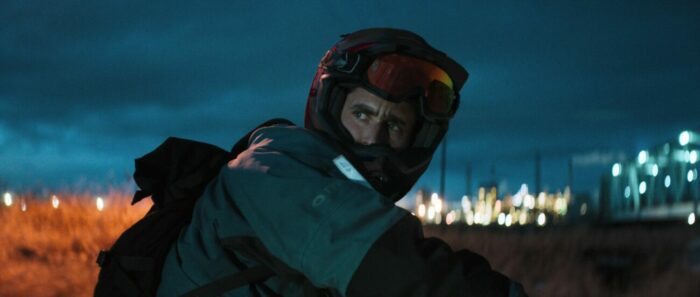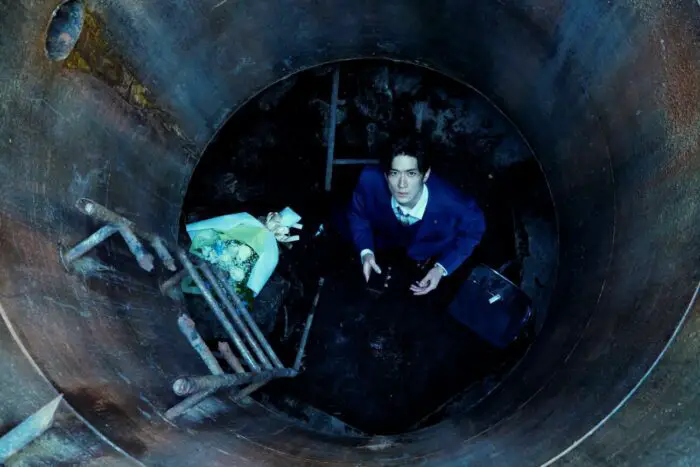The next two films we have take us to two very different extremes, and it shows the heart of Fantastic Fest. Films that are out of the norm and deserve recognition thrive at Fantastic Fest. Even when a film at FF doesn’t jive with me it’s never because it’s a bad film; in fact, I don’t think I’ve ever seen a bad film at Fantastic Fest. These two films take us to very different worlds. One is a gritty look at the underbelly of the UK, while the other is takes us to the bottom of a hole in Japan.
Jackdaw
Written and directed by Jamie Childs

Jackdaw is a twisting tale of murder and intrigue that takes the viewer on an emotional roller coaster. Or should I say motorbike ride? The film follows former motocross champion and Army Veteran Jack Dawson (Oliver Jackson-Cohen), who looks after his younger brother Simon (Leon Harrop). Down on his luck, he goes on a job for Silas (Joe Blakemore), resulting in his brother’s disappearance. Determined to get his brother back, Jack finds himself running into old friends and foes, putting his mental fortitude to the test at every turn.
Oliver Jackson-Cohen goes from Hill House to the Red House in this engaging thriller. Jackson-Cohen is a brilliant actor and Childs pulls another top-notch performance from him. He’s always been great at playing a brooding, unfixable man, but there’s a lot of depth to this character. His undying love for Simon fuels his consequential actions; Jackson-Cohen completely embodies Jack, making every action tear you up emotionally. His onscreen chemistry with Jenna Coleman, who plays Bo, is extraordinary. They really just mesh so well together, you can feel their history in their eyes. I would also be remiss to not mention the spectacular Thomas Turgoose, everyone’s favorite sympathetic hoodie from Eden Lake.
Jamie Childs has had a very interesting career with some great episodes of television and short films to his name. Jackdaw as a debut feature film is very impressive. This film is his love letter to Northern England, and it shows. While we do meet a dark set of characters, some of them feel tongue-in-cheek in a self-reflective way rather than a cheesy way. Plus, the way Childs captures Northern England is stunning. Jackdaw is set against the backdrop of a dark Northern England night but still shows the true beauty of the land. Even the trash-laden exterior of Nocturnal provides a sense of beauty. Each shot has an incredible amount of passion and creativity behind it, with nary a lazy image to be captured. Childs is a filmmaker who has nailed his style and wholly understands what that style is.
Jackdaw is an emotionally-charged thriller that never lets you know its next move. It’s kind of like if Premium Rush was actually a good movie, and a lot darker. Think Premium Rush meets Drive, but the steering wheel is on the right side of the car. Knowing about the thought process behind the film makes the score and soundtrack make a little bit more sense, which was the only big issue I had with the film. A motocross action thriller should be rife with heavy guitar licks and pounding drums, so the inclusion of 90s techno/funk was a bit different. But you can’t say that Childs didn’t fully commit to the score. By the end, I was able to accept the score and its play toward the final vision of the film.
#Manhole
Written by Michitaka Okada // Directed by Kazuyoshi Kumakiri

As stated earlier, even when there are films at Fantastic Fest that don’t work for me, I can still find enjoyment in them; that goes to show how carefully they curate their selection. #Manhole is an interesting film, but I’m not sure if it’s for the right reason. Shunsuke Kawamura (Yûto Nakajima) finds himself stumbling home from a bar after a pre-wedding party, hosted by friends and coworkers. As he leaves the bar, well, he falls into a 20-ish foot manhole. What should seem like an easy rescue attempt turns into a tale of desperation, self-reflection, and survival.
Let’s start with the positives. This is a literal chamber piece. Roughly 90% of the film does indeed take place in the manhole, so it’s not like Quicksand where the quicksand is only half of the film. There are mainly two characters in the film Shunsuke and Mai Kudô (Nao), we are with Shunsuke the whole time and we get Mai from their phone calls back and forth. The single on-screen character, who communicates constantly with an off-screen character, does a lot to build the tension and claustrophobia. Yûto Nakajima is a solid actor and for the most part plays the iterations of his character well, leaving you wondering when he’s being his true self and when he’s being who he thinks he needs to be. Nao, on the other hand, plays her voice-over work with so much dedication. How Shunsuke didn’t put two and two together is beyond me, because if I had just one of these conversations with Nao I’d be questioning everything.
Here’s where the film falls apart for me. The idea of Michitaka Okada’s script is a solid foundation, there’s no question there. It doesn’t feel as if it were handled properly in the long run. The outcome does justify the means, though it’s the majority of #Manhole that really falls apart. Sure, there are plot devices set up that sort of make some of my issues with the film null and void towards the end, but it would have at least felt like Okada wanted to lead us in a direction. Rather, the route he takes with this script tries oversimplification for far too long and by the point we get the exposition it is SO over-complicated that it feels a bit demeaning. By the end of the film, I felt as if I were being talked down to and then force-fed the actions that landed Shunsuke in the hole.
Visually, #Manhole stayed fairly interesting enough to keep me engaged, though there is a lot of watching Shunsuke sit on the ground and scream into a phone. Kazuyoshi Kumakiri and cinematographer Yûta Tsukinaga almost do enough to keep the majority of the shots engaging, though the film is unquestionably carried by Nakajima. There’s an argument to be made that the mundanity and repetitiveness of the manhole is filmed in a way to make the audience member feel trapped with Shunsuke, and I appreciate that argument. I just don’t feel as if Kumakiri was able to pull it off.
#Manhole is not a bad film by any means, it just left me wanting a lot more than we were given. If that is what Kazuyoshi Kumakiri and Michitaka Okada were going for, then I’d retroactively say it worked for me, but I don’t think it was. How Shunsuke didn’t put it all together until it was spoonfed to him undermines the character he is built up to be. The film has a story to tell, and whether or not you accept that story by the end of the film is up to you.



